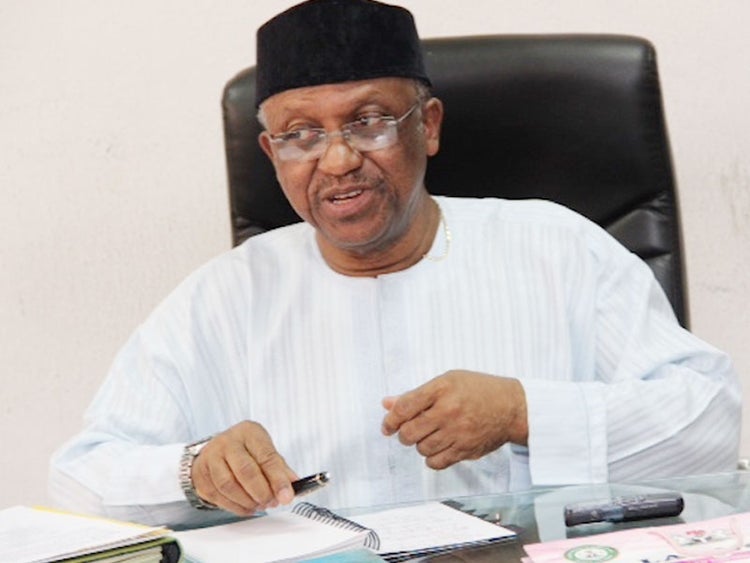Before we hire Diaspora doctors, nurses
The federal government has announced that it is considering hiring Nigerian doctors abroad to serve the medical needs of Nigerians back home. This announcement was made by the Minister of Health, Osagie Ehanire, recently in Abuja. Even while the modality of how this scheme is going to work is being fleshed out, it is a […]

Minister of Health, Osagie Ehanire
The federal government has announced that it is considering hiring Nigerian doctors abroad to serve the medical needs of Nigerians back home. This announcement was made by the Minister of Health, Osagie Ehanire, recently in Abuja.
Even while the modality of how this scheme is going to work is being fleshed out, it is a major acknowledgement of the worrying exodus of doctors from the country. This mass migration of Nigerian-trained medical personnel to foreign hospitals has severely compromised the already rickety health sector in the country.
Just this October, the president of the Nigerian Medical Association (NMA), Rowland Ojinmah, announced that presently, at least 50 doctors leave the country every week to find employment elsewhere. Speaking at another symposium, Mr Ojinmah said 5,600 medical doctors have left Nigeria for greener pastures abroad in the last eight years alone. Coupled with the deplorable health infrastructure, this has put the country’s health sector in the red.
The minister’s proclamation is a recognition by the federal government of the need to either reverse the trend or utilise it to some advantage. The minister’s proposal includes working out an arrangement for Nigerian doctors abroad to harness information technology to connect to medical personnel in Nigeria and offer training and consultancies. The programme will also see these doctors affiliated with medical institutions in Nigeria to facilitate their occasional return to offer training and capacity building.
While the minister acknowledged that labour mobility is increasing globally and doctors from other countries like the UK are migrating to places with better pay like New Zealand and Canada may be true, but the situation in Nigeria is at a level that calls for serious concern.
While this idea may not be entirely bad, it is necessary to stem the tide of the mass exodus of medical practitioners before trying to tease those who have left to come back in whatever capacity. This means that the crisis in the health sector needs to be addressed urgently.
As it is, resident doctors in the country may embark on yet another strike if the federal government does not meet their demands for, among other things, improved hazard allowances. This threat was contained in a letter by the president of the National Association of Resident Doctors (NARD), Emeka Orji, to the health minister, Ehanire, just last week.
It is not a secret that the entirety of the health sector needs reforms. Doctors, nurses and other support staff are underpaid and overworked. Many struggle to find decent accommodation and support systems to facilitate the discharge of their duties. This, coupled with insane work hours, patient overload, poor health facilities, most of which are in a deplorable state, and a shortage of required equipment, means that the health sector needs to be comprehensively reformed.
Equally important, government at all levels must take definite steps to develop local infrastructure for medical research and the manufacture of medical equipment to reduce reliance on importation. Many of our medical personnel leave the country out of frustration from the lack of diagnostic equipment. Boosting research will also engage many of them and help broaden their knowledge.
There is also the need for reforming our medical training in a way that harmonises the training of new doctors trained in foreign countries with those trained here at home. This will help to avoid the recurring situation whereby many potential doctors trained in several foreign countries like Ukraine, Russia, Hungary, etc, never get to practice here, thereby diminishing the number of doctors available to work here.
What the minister’s plans will encourage at this point, is the continued exodus of medical personnel who will now look to earn improved pay in the countries they migrate to and also hope to cash out on this plan to hire them by the FG in this new role. In the end, this strategy if considered carefully may only be treating the symptom of the disease, not the disease itself.
We recognise the need to urgently address the brain drain, especially in the medical sector but whatever programme the government designs to address, this must start with addressing the causes of the mass migration in the first place. We recognise that hiring Nigerian experts in the diaspora is in line with global best practices, however, the modalities of this arrangement must be clearly thought out, and articulated in a way that weighs all the pros and cons and helps rather than hinder the attempt to revive the health sector.
This is a matter of national emergency and must be treated as such.
